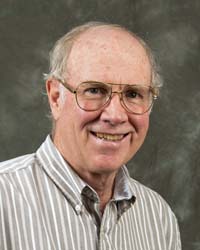
Salmon, Edward D.
Research Professor (Retired James Larkin and Iona Mae Ballou Distinguished Professor)
tsalmon@email.unc.edu
608 Fordham Hall
(919) 962-2265 (office)
Ted Salmon is a Cell Biologist and Biophysicist whose primary research is directed towards understanding the molecular mechanisms governing the assembly of spindle microtubules and the segregation of chromosomes during mitosis. Our working hypothesis is that mitosis will be explained by the molecular and structural properties of the centrosome which organizes and nucleates the polymerization of spindle microtubules, the assembly of microtubules which orient and participate in the generation of chromosome movements, and the microtubule motors such as the kinesin and dynein families of proteins which appear to generate polarized forces along the lattice of microtubules, at kinetochores, and within the spindle fibers. The laboratory has pioneered the development of video and digital imaging microscopy methods for analysis of molecular and structural dynamics in living cells and in vitro. We have developed fluorescently labeled tubulins to serve as tracers in studies of the dynamic pathways for microtubule assembly in vivo and in vitro using low light level fluorescence microscopy and digital image processing techniques. We have also developed high resolution video microscopy methods for visualizing the polymerization of individual microtubules and the motility of motors in living cells and reconstituted preparations. These functional assays provide the basis for determination of the basic mechanisms of microtubule polymerization and motor function, analysis of kinetochore motility, and the means of eventually achieving reconstitution of chromosome segregation in reconstituted preparations in vitro. There is also an interest in the lab in how hydrostatic pressure alters the assembly and function of the cytoskeleton and how organisms have adapted to the effects of deep sea pressures.